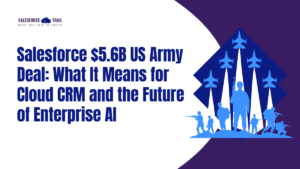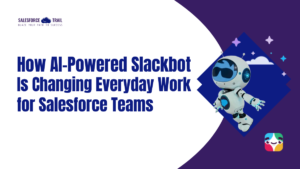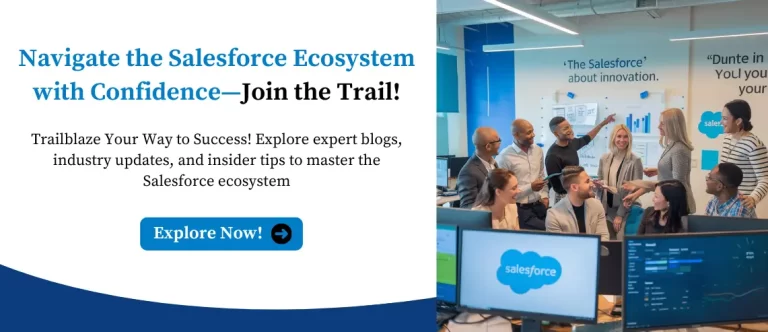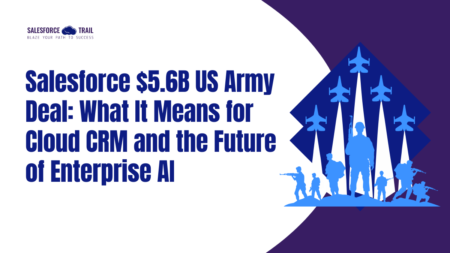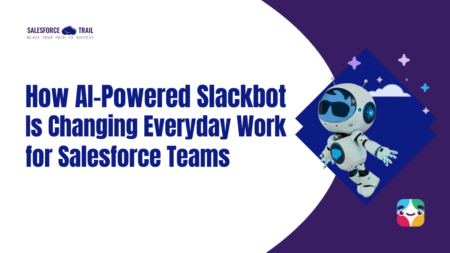Salesforce Agentforce is revolutionizing customer engagement with AI-powered automation and intelligent workflows. However, to fully leverage Agentforce’s potential, businesses need a team equipped with essential skills. Each role from data management to UX design is important in improving AI interactions and ensuring seamless integration within the organization’s technological framework.
This article covers the must-have skills for a high-performing Salesforce Agentforce team and how they contribute to success.
Product Management: Aligning AI with Business Goals
At the core of every successful Agentforce implementation strategy should be clear. Product managers ensure that AI initiatives align with business objectives and customer needs. They prioritize features, manage workflows, and keep the development process customer-centric.
A dedicated product manager or a key stakeholder must oversee the implementation to guarantee smooth execution and continuous improvement.
Developer & System Architecture: Laying the Technical Foundation
A strong technical foundation is crucial for Agentforce’s efficiency. Developers and system architects ensure AI solutions integrate seamlessly with existing Salesforce tools. Depending on the project’s complexity, businesses may need:
- Salesforce Administrators are responsible for configuring and maintaining the system.
- AI Engineers for advanced customization and automation.
- Solution Architects for designing scalable and sustainable workflows.
Having the right technical expertise ensures smooth functionality and maximizes the impact of AI-powered agents.
Data Management: Fueling AI with Quality Data
AI-driven customer service is only as good as the data it processes. That’s why data management is a cornerstone skill for any Agentforce team. Proper data structuring, governance, and cleansing ensure that AI-powered interactions are accurate and relevant.
Depending on the scale of implementation, a business may assign this role to a Salesforce admin or hire a data engineer for more sophisticated data strategies.
Knowledge Management: Structuring Information for Instant AI Access
For AI agents to provide accurate responses, they need a well-organized and easily accessible knowledge base. Knowledge management specialists structure, update, and optimize content so AI can retrieve information quickly and efficiently.
Salesforce admins with expertise in content management and information architecture can take on this role to ensure seamless knowledge delivery.
Reports & Dashboard Management: Tracking AI Success
Measuring the performance of AI-driven customer interactions is essential for continuous optimization. Reports and dashboards provide insights into key metrics like:
- Customer Satisfaction (CSAT) scores
- AI interaction success rates
- Common customer queries and resolutions
This role is best handled by Salesforce administrators, business analysts, or data analysts with strong analytical skills to translate raw data into actionable insights.
API Development: Expanding AI Capabilities
Agentforce is most powerful when integrated with various business applications. API development ensures seamless data exchange, workflow automation, and enhanced AI functionality. For organizations that require complex integration solutions, having a backend developer or a MuleSoft specialist is essential. These professionals facilitate the connection between Agentforce, various third-party systems, and databases for a more robust customer experience.
UX Design: Crafting Intuitive Customer Interactions
The effectiveness of AI-driven interactions depends on their usability. A well-designed user experience (UX) makes AI conversations more natural and engaging. UX designers focus on:
- Creating user-friendly chat interfaces
- Reducing friction in AI interactions
- Ensuring consistency across all customer touchpoints
A UX designer with knowledge of AI-driven interactions can help shape an intuitive experience that enhances customer engagement and satisfaction.
How to Strengthen Your Salesforce Agentforce Team
Identify In-House Talent
Many businesses already have professionals with transferable skills. Salesforce admins, business analysts, and developers may have the expertise required to take on key Agentforce roles. Identifying and upskilling existing employees can accelerate AI adoption.
Invest in Certifications
Organizations should encourage certification programs such as the Agentforce Specialist Certification to ensure team members are equipped with the latest AI and Salesforce capabilities. This validation ensures expertise in managing AI-driven customer engagement.
Foster a Culture of Continuous Learning
AI technology evolves rapidly, and businesses must stay ahead. Encouraging team members to attend Salesforce training, participate in webinars, and stay updated on industry trends fosters innovation and long-term success.
Final Thoughts: Building a Future-Ready Salesforce Agentforce Team
Salesforce Agentforce represents a new era of AI-powered customer engagement, but its effectiveness depends on the skills behind it. To fully harness the capabilities of Agentforce businesses should form a team proficient in product management, system architecture, data management, knowledge organization, reporting, API development, and UX design.
Success in AI implementation isn’t just about technology—it’s about people. With the right mix of skills and ongoing training, organizations can create exceptional customer experiences, streamline operations, and gain a competitive edge in today’s digital landscape.
Must Visit Links:
- How I Passed the Salesforce Data Architect Exam on My First Attempt
- How to Start Your Salesforce Career as a Beginner 6 Months Full Proof Plan
- Salesforce Marketing Cloud Career Path in 2025: Your Complete Beginner’s Guide
- Agentblazer vs Trailblazer: What’s the Key Difference?
- How to Prepare for the Certified Agentforce Specialist Certification Exam
Resources
- [Salesforce Developer]- (https://developer.salesforce.com/)
- [Salesforce Success Community] (https://success.salesforce.com/)
For more insights, trends, and news related to Salesforce, stay tuned with Salesforce Trail
Mark Jacobes is a seasoned Salesforce expert, passionate about empowering businesses through innovative CRM solutions. With over 6 years of experience in the Salesforce ecosystem, Mark specializes in Salesforce development, integrations, and digital transformation strategies.
- Mark Jacobeshttps://salesforcetrail.com/author/markjacobes/September 8, 2025
- Mark Jacobeshttps://salesforcetrail.com/author/markjacobes/
- Mark Jacobeshttps://salesforcetrail.com/author/markjacobes/
- Mark Jacobeshttps://salesforcetrail.com/author/markjacobes/

